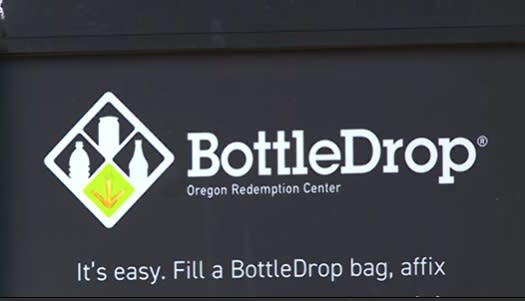Oregon bottle bill ‘not intended as cash for addicts’
PORTLAND, Ore. (KOIN) — Keith Martin, Sandeep Divekar and Larry Cusack say they love the Oregon bottle bill. But they said the world has changed since it’s inception in 1971 and they want the bill adapted to the world as it is today.
They are very pleased Gov. Tina Kotek decided to continue the temporary suspension of cans-for-cash at the Safeway and Plaid Pantry locations near SW 10th and Jefferson for one more month.
“I was so pleased to hear the 30 days because it shows a will to do what’s right for the people of this community,” Martin told KOIN 6 News.
Residents in that area said it significantly cut down on crowds of drug use and dealing of fentanyl at all hours.
“As soon as that changed,” Divekar said, “we noticed an immediate change in the neighborhood.”
Cusack agreed. “It made a considerable difference.”
In the time the temporary suspension has been in place, nearby residents said it’s remained clean and quiet outside the grocery store. But since the action is temporary, (and has merely moved a few blocks away) they said it’s time to consider tweaking Oregon’s bottle bill.

Their suggestions: move individual redemption sites to industrial areas; restrict non-bagged redemption hours at stores from 8 a.m. to 6 p.m.; make the money for the redemption only eligible for groceries — so it’s not, as Divekar said, “immediately going into the hands of the drug dealers.”
The president of Plaid Pantry said the issues with in-store bottle recycling are harming his staff, particularly those who work overnight.
Plaid Pantry is open 24 hours a day. Jonathan Polonsky said his overnight staff are swarmed by several people at a time who want to exchange bottles for cash.
“Why make a clerk at 2 in the morning have to deal with cans for cash?” Martin said.
These downtown residents think fine tuning the bottle bill will improve public safety.
“We have to look at what the bottle bill was originally intended to do, which is recycling. It’s doing that well,” Martin said. “It wasn’t intended to be a cash source for drug addicts.”
Divekar said when the bottle bill was first passed it was to curtail littering. “It was not about people making a living collecting cans, so I think that also needs to be looked at.”
It’s unclear if Oregon lawmakers have an appetite for this kind of change.
When KOIN 6 News asked the governor’s office a few weeks ago if making bottle bill changes was something anyone was seriously talking about, her office said no. These spots, they said, were very problematic but that sites across the state are working fine.
However, the president of Plaid Pantry recently called for similar changes.
The sites are scheduled to return to accepting individual bottles on May 1.
KOIN 6 News will continue to follow this story.
For the latest news, weather, sports, and streaming video, head to KOIN.com.
